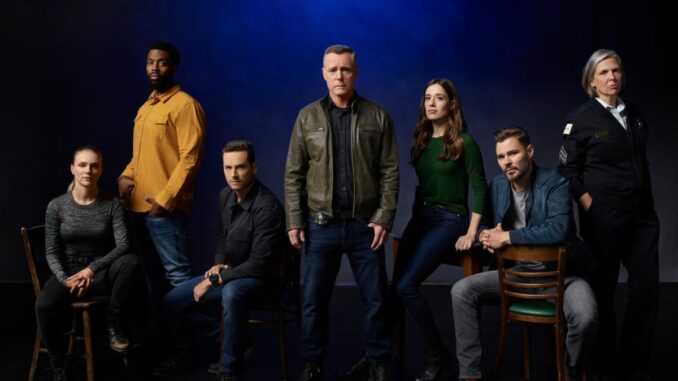
The gritty, authentic world of intelligence in the Windy City has captivated audiences for over a decade, and at its heart lies the formidable ensemble of "Chicago P.D." More than just a procedural, the series has become a chronicle of its characters' lives, triumphs, and heartbreaks. For viewers who have journeyed alongside them since that fateful backdoor pilot in 2013, one of the most compelling narratives unfurls not just in the script, but on the very faces of the cast: their "amazing transformations" from fresh-faced detectives to battle-hardened veterans, echoing the passage of time both on and off the screen.
Cast your mind back to the inaugural seasons. Detective Jay Halstead, portrayed by the effortlessly charming Jesse Lee Soffer, was the earnest, idealistic counterpoint to Voight's moral ambiguity. Soffer, then in his late twenties, exuded a boyish charm, his piercing blue eyes reflecting a nascent desire to do good within the corrupt system. Fast forward to his eventual, poignant departure, and Soffer's Halstead was a man etched with weariness, his features hardened by years of trauma, loss, and the constant dance with darkness. The subtle lines around his eyes, the slight downturn of his mouth, spoke volumes of a character who had carried the weight of the world, and an actor who had masterfully matured into the role.
Similarly, Marina Squerciati's Kim Burgess began her journey as a spirited patrol officer, brimming with ambition and a hopeful innocence. Her "then" persona was defined by an almost preppy neatness, an eager-to-please posture. Over the years, Burgess has endured unthinkable tragedies: a shooting, a kidnapping, the loss of a child, and the arduous path to motherhood. Squerciati's transformation is nothing short of profound. Her once-smooth features now carry a quiet strength, her eyes holding the deep wisdom of survival. Her physical posture has shifted from eager to resilient, embodying a woman who has been broken and rebuilt, her resilience manifesting in a powerful, grounded presence. She wears her character's history not just in her performance, but in the very contours of her face.
Then there's Patrick John Flueger's Adam Ruzek. Introduced as a cocky, somewhat impulsive rookie fresh from the academy, Flueger initially embodied a youthful exuberance, his boyish good looks and easy smile hinting at a life yet untouched by serious consequence. His "now" is a study in evolution. Ruzek has shed layers of immaturity, becoming a dedicated detective, a loyal partner, and recently, a doting father. Flueger's face now carries a mature gravitas; the lines around his eyes are less about boyish grins and more about the burdens of responsibility. His physique seems to have settled, reflecting a man who has found his purpose, his earlier brashness replaced by a quiet, dependable strength.
And, of course, the immovable anchor of Intelligence: Hank Voight, brought to life by the incomparable Jason Beghe. From day one, Beghe's portrayal was an exercise in raw intensity, his gravelly voice and piercing gaze creating a character who walked a fine line between hero and villain. In those early seasons, there was a coiled tension, a barely contained rage. A decade later, Beghe's transformation is less about radical change and more about deepening. His "now" Voight is a man whose lines are more deeply etched, whose eyes seem to hold an even greater, more profound weariness. His silver hair has become more prominent, his posture perhaps a touch more stooped, reflecting the countless battles fought and the immense personal sacrifices made. Yet, through it all, the core intensity remains, amplified by the wisdom and scars of time. He's not just older; he's more lived.
Even the steadfast figures like Amy Morton's Desk Sergeant Trudy Platt have undergone subtle, yet significant shifts. Platt, ever the acerbic gatekeeper, was always a formidable presence. In her "then," there was an almost impenetrable wall of sarcasm and no-nonsense attitude. Her "now" retains that sharp wit, but beneath it, the slightest softening has occurred, revealing glimpses of the empathetic woman beneath the gruff exterior. Morton's nuanced performance allows us to see the passage of time not just in a few more lines around her eyes, but in the subtle softening of her character's edges, a testament to growth that isn't always overt but deeply felt.
The "amazing transformations" of the Chicago P.D. cast are more than just the inevitable march of time or the natural aging process. They are visual metaphors for the journeys their characters have endured, the wisdom they've gained, and the emotional weight they carry. Each deepened line, each settled feature, each glint in their eyes tells a story of survival, dedication, and the relentless pursuit of justice in a city that demands everything. As we look at their "then" photos juxtaposed with their "now" visages, we don't just see physical change; we see the profound evolution of artists who have poured their lives into these roles, creating a living, breathing tapestry of human experience that continues to resonate with millions.
